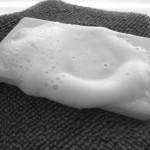False.
 Antibacterial soaps have become incredibly popular over the past five to ten years. It can actually be slightly overwhelming to walk down the soap isle at your shopping market and see all of the antibacterial soap choices available. Roughly between 70 and 75% of soaps available for purchase have “antibacterial” someplace on the label. This, as well as wording like “kills up to 99.9% of bacteria” may help explain why these soaps have grown in popularity. But the question still remains – are antibacterial soaps any better at killing germs than good old fashioned soap and water? Most of the research on the topic is suggesting no. Allison Aiello and colleagues (2007) published a review article in the journal Clinical Infectious Diseases in which they examined the results of 27 studies on this topic. The authors concluded “Collectively, the microbiological efficacy studies strongly suggest that concentrations of triclosan used in consumer liquid hand soaps do not provide a benefit over plain soap for reducing bacterial levels found on the hands.”
Antibacterial soaps have become incredibly popular over the past five to ten years. It can actually be slightly overwhelming to walk down the soap isle at your shopping market and see all of the antibacterial soap choices available. Roughly between 70 and 75% of soaps available for purchase have “antibacterial” someplace on the label. This, as well as wording like “kills up to 99.9% of bacteria” may help explain why these soaps have grown in popularity. But the question still remains – are antibacterial soaps any better at killing germs than good old fashioned soap and water? Most of the research on the topic is suggesting no. Allison Aiello and colleagues (2007) published a review article in the journal Clinical Infectious Diseases in which they examined the results of 27 studies on this topic. The authors concluded “Collectively, the microbiological efficacy studies strongly suggest that concentrations of triclosan used in consumer liquid hand soaps do not provide a benefit over plain soap for reducing bacterial levels found on the hands.”
Triclosan is the major antibacterial agent in antibacterial soaps. There are even some studies that suggest triclosan may contribute to resistant strains of bacteria and kill healthy bacteria on the skin. Additionally, in 2005, an FDA advisory group studied this topic and came to the conclusion that there is no evidence that antibacterial soap is superior to regular soap. It certainly is important to wash our hands, especially when we are sick, if we are cooking and handle raw meat, and after we go to the bathroom. However, most of us do a pretty horrible job when it comes to washing our hands. Proper hand washing technique calls for first wetting the hands, lathering the hands with soap for a minimum of 20 seconds, and then rinsing your hands for another 10 seconds. Next time you wash your hands; see how long it really takes you!
Reference:
Aiello A, Larson E, Levy S: Consumer antibacterial soaps: effective or just risky? Clinical Infectious Diseases (2007), Vol 45, pps. S137-S147.
